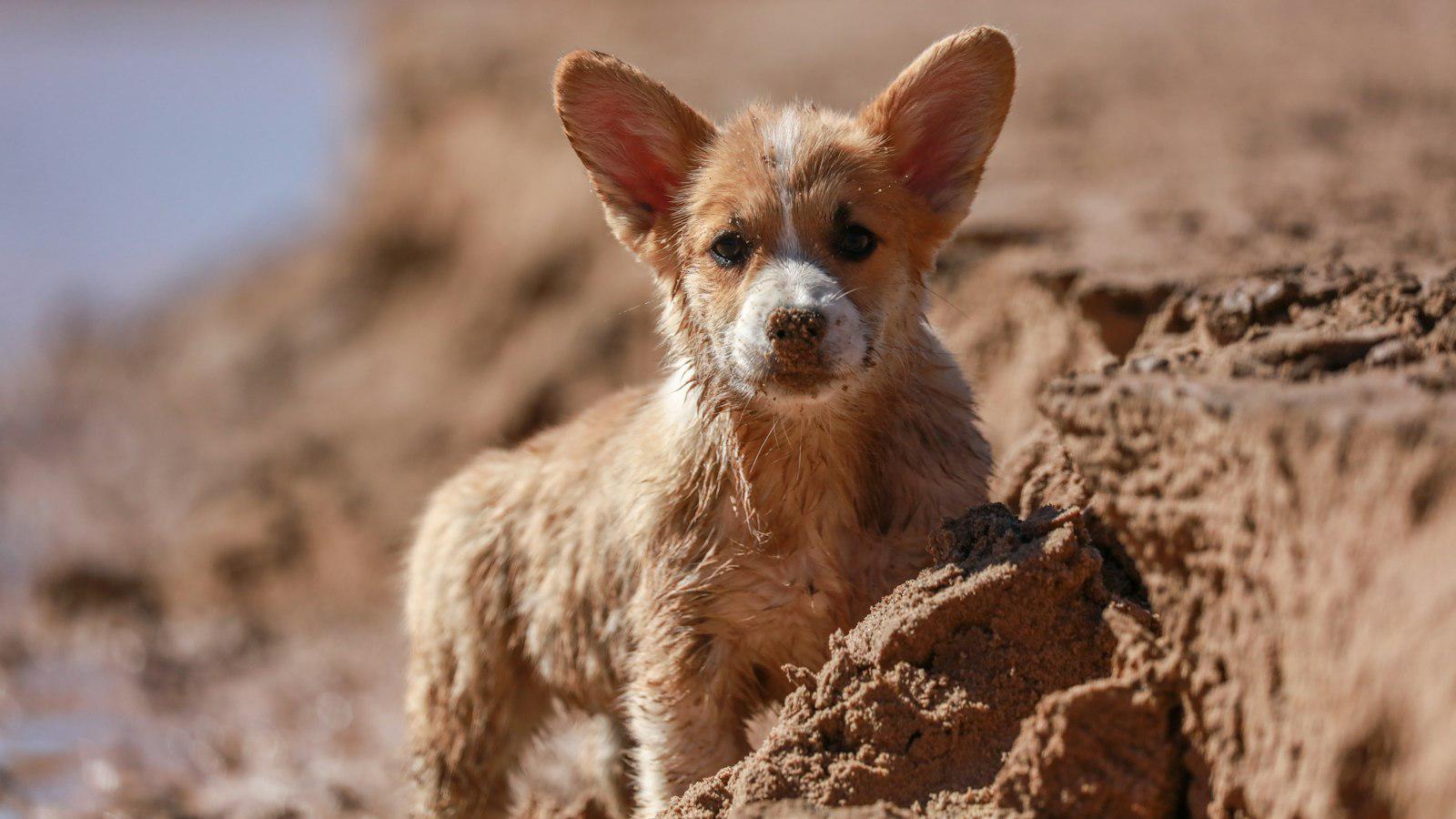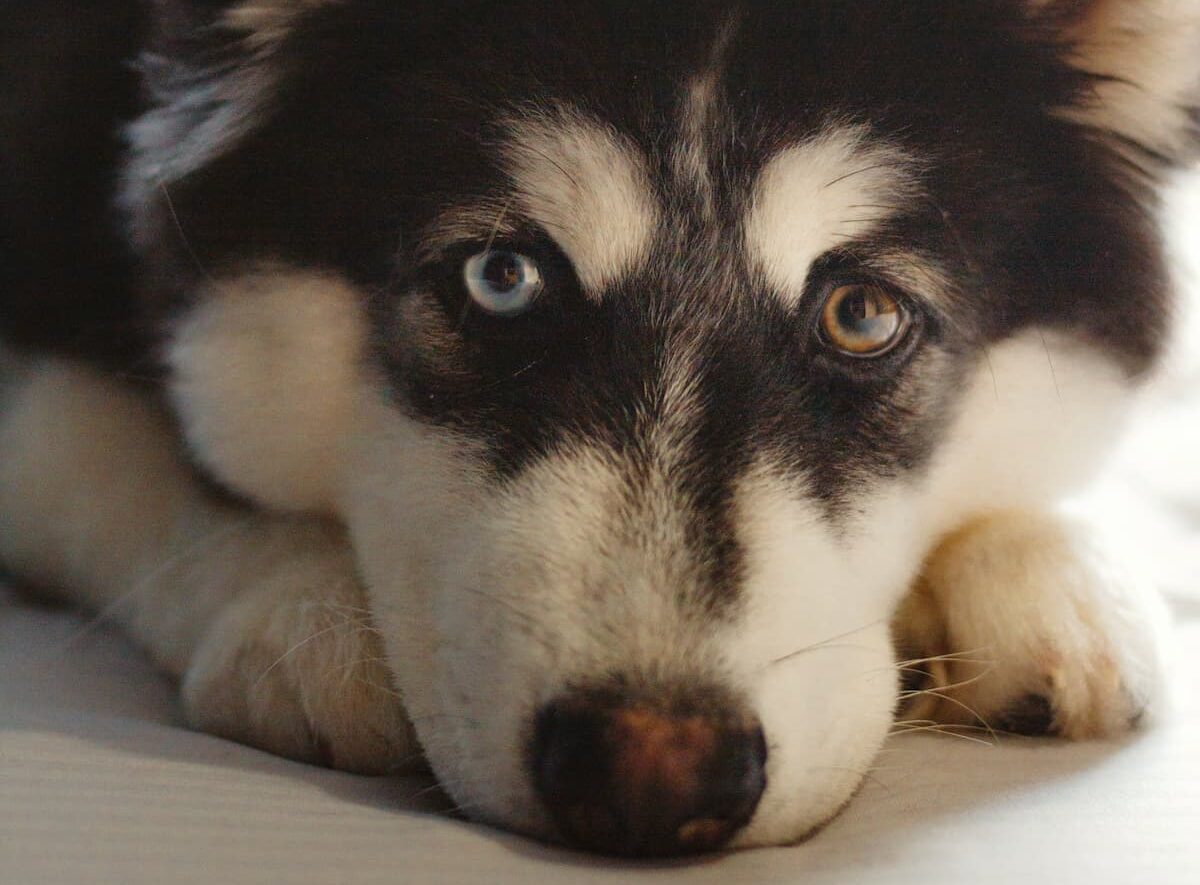It’s a situation we’ve all been in before.
You’re sitting on the couch, engrossed in your favorite TV show, when suddenly you feel a pair of eyes boring into your soul.
You turn your head to find your furry companion, Fido, locked in a gaze that seems to stretch on for eternity.
It’s almost as if he’s trying to communicate something to you, but what?
Read on to find out.
Unraveling the Mystery Behind Why Dogs Lock Eyes with You
Have you ever noticed your furry friend’s intense gaze, with those deep, soulful eyes fixed on you?
It’s a seemingly innocent action, but you can’t help but wonder what lies behind that intense stare.
Dogs have a unique ability to communicate with us through their eyes, and there’s more to it than meets the eye:
1. Connection and Affection: When your dog gazes into your eyes, it’s not just staring blankly—it’s a sign of affection and a desire to connect.
This unwavering eye contact releases a hormone called oxytocin in both you and your canine companion, creating a bond similar to the one between a parent and child.
It’s their way of saying, “I trust you, and I love you.”
2. Seeking Information: Dogs are incredible observers.
By locking eyes with you, they are trying to understand your emotions and intentions.
They read your facial expressions, body language, and even the subtlest of cues.
Our canine friends are incredibly perceptive, and eye contact helps them gauge your mood, assess the situation, and respond accordingly.
They do this not to challenge your authority, but rather as a means of seeking guidance and reassurance.
3. Affirmation and Attention: Dogs are social animals who thrive on human interaction.
When they stare at you, they may be seeking validation, approval, or simply asking for your undivided attention.
That intense gaze is their way of saying, “Hey, I’m here, and I want to be acknowledged.”
So the next time your pup locks eyes with you, don’t be too quick to look away.
Embrace the moment, engage with your dog, and relish in the incredible bond you share.
4. Hormone Release: A long gaze between you and your furry companion triggers the release of oxytocin, often referred to as the ”love hormone.”
Yes, you heard that right!
Research has shown that both humans and dogs experience a boost of oxytocin when they lock eyes, strengthening the bond between them.
This chemical reaction contributes to the deep emotional connection we share with our four-legged pals.
5. Asserting Dominance: Dogs may also stare as a way to assert dominance or establish control.
If your dog’s gaze feels intense or accompanied by other signs of aggression, it’s essential to seek professional guidance to address and redirect this behavior.
6. Hunger: Dogs are known for their love of food, and when they stare at you, it could be their way of asking for a tasty treat or a meal.
They may be hoping that their intense gaze will melt your heart and make you give in to their desires.
While it’s important to maintain a healthy diet for your furry friend, a small reward every now and then can strengthen your bond and make them feel loved and cared for.
Deciphering the Motives behind Prolonged Doggy Gazes
Dogs are experts at using their body language to convey their desires and feelings, and their prolonged gazes are no exception.
While every dog is unique, certain common triggers can shed light on the motives behind their intense stares.
If your pup is staring at you with soft, relaxed eyes and accompanied by other signs of contentment like a wagging tail and relaxed body posture, chances are they’re expressing their love and affection for you.
On the other hand, if those fixed eyes are coupled with a tense body, stiff tail, and possibly even drooling, your furry friend might be trying to get your attention for a more tangible reward – who can blame them for wanting an extra treat?
Dos and Don’ts for Nurturing a Healthy Human-Dog Relationship
Now that you know the secret language behind your dog’s staring, here are some tips on how to conduct proper doggy eye contact etiquette.
The Dos
1. Encourage eye contact during training sessions: Eye contact can foster a stronger bond and help establish trust between you and your canine companion.
It’s a way for them to connect with you and seek guidance during learning moments.
2. Pay attention to the context: Dogs often use eye contact to gauge your emotions and intentions, so be aware of the surrounding situation.
If your pup is staring at you with a relaxed body posture, wagging tail, and a happy expression, they could simply be seeking affection or attention.
3. Return the favor with love: Dogs shower us with unconditional love, and maintaining eye contact can be their way of expressing that heartfelt connection.
Gaze back at your furry friend, blink slowly, and offer a gentle smile to let them know you feel the same.
The Don’ts
1. Avoid prolonged staring contests: While it can be tempting to engage in staring competitions with your dog, it’s important to remember that direct, unwavering eye contact can make some dogs uncomfortable or even perceive it as a threat.
Respect their boundaries and be mindful of their comfort level.
2. Refrain from staring when correcting behavior: Dogs are highly intuitive, and they can pick up on subtle cues.
Instead of staring them down while addressing a behavioral issue, try redirecting their attention, using positive reinforcement, or applying other training techniques recommended by professionals.
Now that you’re equipped with some eye contact etiquette, you can better understand the reasons behind your dog’s intense gazes and confidently nurture a healthy human-dog relationship.
Remember, each dog is unique, so pay attention to their individual signals and always shower them with love and affection!
FAQ
Q: Why do dogs have a tendency to stare at us for prolonged periods?
A: Firstly, it’s important to understand that dogs have evolved as social animals, genuinely valuing and relying on their bond with humans.
By intently staring at us, they are attempting to establish communication and strengthen our connection.
Q: Is there a specific emotional trigger behind their intense gaze?
A: Yes, indeed!
Dogs often stare at their owners when they’re seeking attention, affection, or even a good ol’ play session.
Think of it as their way of saying, ”Hey, I’m here, and I need some love or interaction!”
Q: Can prolonged eye contact be an indicator of aggression in dogs?
A: While dogs can certainly use eye contact to show aggression, it’s essential to assess the context and other body language before jumping to conclusions.
In most cases, when Fido is staring intently, it’s usually an attempt to engage with positive intent.
Q: Can this behavior be a sign of their unconditional love for us?
A: Absolutely!
Dogs are incredible creatures overflowing with love, and their extended stares can undoubtedly be an expression of their affection for us.
By gazing into our eyes, they’re displaying loyalty, trust, and their unwavering devotion.
Q: Are there any scientific studies supporting the idea that dogs stare at us to bond?
A: Indeed, there are!
Research indicates that gazing into each other’s eyes releases oxytocin, which is often referred to as the “love hormone.”
This hormone promotes bonding and feelings of affection, strengthening the connection between humans and their furry companions.
Q: Can dogs’ extended periods of staring be interpreted as a sign of anxiety or fear?
A: Possibly, but it’s crucial not to jump to conclusions.
Dogs may stare for various reasons, and anxiety or fear might be one of them.
However, other accompanying behaviors such as body stiffness or avoidance can provide a clearer picture.
It’s best to consult a professional if you have concerns about your dog’s behavior.
Q: Is it ever appropriate to stare back at a dog that’s staring at you?
A: While eye contact is generally seen as a bonding experience, continuously maintaining direct eye contact with an unknown or fearful dog might be interpreted by them as a challenge or threat.
In such cases, a gentle and reassuring glance is usually preferable.
Q: What’s the best way to respond when our furry friends gaze at us?
A: Well, it depends on the situation and what the dog might be signaling.
Offering them your undivided attention, engaging in play, or giving them some well-deserved cuddles are often great ways to reciprocate their affection.
Trust your instincts and keep strengthening that beautiful bond you share with your four-legged companion.
Remember, our pups have non-verbal ways of communicating, and their staring is just one piece of their unique language.
Embrace and appreciate those captivating gazes, as they are an integral part of what makes our relationship with dogs so special.
Navigating the Journey’s Highlights
And that is the secret language behind those intense and unyielding gazes from our furry companions.
From the depths of their big, soulful eyes, dogs communicate a multitude of emotions, needs, and desires.
Whether it’s their way of saying, “I love you,” seeking attention, pleading for a tasty treat, or simply yearning for a playtime buddy, their prolonged stare speaks volumes.
So, the next time you catch your four-legged friend locking eyes with you, don’t ignore it, embrace the connection.
Bask in the affection, respond with love, and remember, that unwavering gaze just might be your faithful companion’s way of saying, “You’re everything to me.












